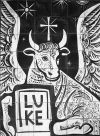
The Gospel of Luke
Sheep and Coins: Lk 15,1-10
Introduction: 15,1-3
The conflict between Jesus and the Jewish leaders, notably the Pharisees, is central to the plot of this Gospel. We could see this chapter as a reflection on that controversy. Jesus is justifying his reaching out to tax collectors and sinners while at the same time criticising the Pharisees for not doing so. I mentioned 5,30 specifically as the great banquet Levi gave after being called by Jesus which led to a complaint by the Pharisees. There Jesus makes his point that he came to call not the (self) righteous but sinners to repentance (5,32).
The tax collectors and sinners are in fact those listening to or hearing Jesus. That is the point made right at the end of the previous chapter (14,35) as well as Jesus' earlier exclamation about those who keep the word of God being blessed (11,28).
With verse 3, I mentioned how rarely the evangelist names Jesus. Not once between 14,3 and 17,13 as far as I can see. (Jesus is though called Lord quite frequently (13,15 and 17,5).)
Back now to the main page
Lost Sheep and Lost Coin: 15,4-10
Matthew in chapter 18 is presenting a discourse on community living. His parable of the lost sheep is therefore addressed to the disciples and is about reconciliation within the community. Whereas for Luke in this chapter as we have seen, Jesus is in controversy with the Pharisees. Mt 18,13 has "if" but Lk 15,5 has "when".
Luke has expanded the parable in verses 6 and 7 by adding the party and the consequent joy in heaven.
Psalm 23 "The Lord is my Shepherd" is well known. Ezekiel 34 gives biting criticism of the leaders of Israel for being bad shepherds (Ezk 34,1-6) while the Lord himself will shepherd his sheep
The two parables are clearly parallel in shape: man/woman. lost sheep/lost coin, friends and neighbours, joy/rejoice, the sinner who repents.
There are also differences. In verse 8 it is the woman who actively searches (see 19,10). In verse 5, Luke has added the detail of putting the sheep on the shepherd's shoulders.
The sheep parable is the more fully developed story, just as Simeon's role is greater at the Presentation than that of Anna (2,25-38). For a start, the nine coins will (hopefully) remain in the purse. But leaving ninety nine sheep unattended in the desert would seem to be inviting trouble. Such is the boundless mercy of God.
So far so good, but the story that follows goes much further: we have just heard about a man and woman seeking sheep and coins, now we are going to hear about a father seeking and reaching out to his wayward sons.
The Sunday Gospel
The OT reading from Exodus (Ex 32,7-11.13-14) tells us of the consquences of the people of Israel setting up a gold calf as their idol (Ex 32,1-10). There is a strong emphasis here on the community which is why I asked you to consider the introduction, 15,1-2. In that way it brings out how our chapter 15 in Luke is not just about individual repentance but is a warning for the whole Church.
With the story of the two Sons in the third parable, we might have expected an Old Testament reading which focused more on the individual. That more individual aspect can be found in the psalm because Psalm 51 is the traditional psalm of repentance known as the Miserere.
The Exodus reading also brings out how the God of Israel is a God who is the Lord, a God merciful and gracious, slow to anger and abounding in stadfast love and faithfulness. (Ex 34,6). This is the Father of those sons we are now about to meet.
Return to main page.
Back now to the main page so as to read that story.
